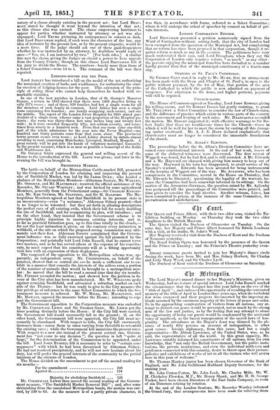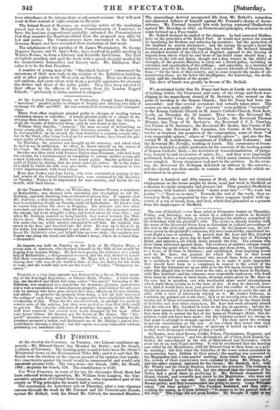(At .3?iirtrupolio.
The Lord Mayor's annual dinner to her Majesty's Ministers, given on Wednesday, had no feature of special interest. Lord John Russell marked the circumstance that the banquet has this year fallen on the eve of the "10th of April " ; and embraced the opportunity of recalling the contrasted memory of the 10th of April in London three years ago, when the turbulent few were overawed and their projects disconcerted by the imposing at- titude assumed by the enormous majority of the lovers of peace and order. So in the approaching congregation of visiters from all nations, any at- tempt to disturb our peace would be prevented, not so much by the strong arm of the law and justice, as by the feeling that any attempt to abuse the opportunity of being our guests would be condemned by the universal voice of manhood, as the basest transgression of the sacred laws of hos- pitality. The attendance at the Mayor's feast was thinned by the ab- sence of nearly fifty persons on account of indisposition, or other good causes : foreign diplomacy, from this cause, had but a single representative—Mr. Abbott Lawrence, of the United States, was, as he said, the representative of all the world. In this great capacity, Mr. Lawrence suitably informed his constituents of all nations, from his own knowledge, that "not only the British Government, but the public insti- tutions, the private institutions, and even the individual noblemen and gentlemen connected with this country, desire to throw open their picture- galleries and exhibitions of works of art to all the visiters who will arrive here in this year of welcome."
Mr. Thomas Hankey junior has been chosen Governor of the Bank of England, and Mr. John Gellibrand Hubbard Deputy Governor, for the ensuing year.
Mr. John Cotton Cotton, Mr. John Loch, Mr. Charles Mills, Mr. W. H. Chicheley Plowden, M.P., Mr. Henry Shank, and Mr. H. St. George Tucker, have been chosen Directors of the East India Company, in roam of six Directors retiring by rotation. At the end of the London Sessions, Mr. Recorder Wortley informed the Grand Jury, that arrangements have been made for relieving them from attendance at the intermediate or adjourned sessions : they will now meet at four instead of eight sessions in the year.
The Inland Board of Revenue, on receiving notice of the resolution passed last week by the Metropolitan Commissioners of Land-tax, to have the land-tax reapportioned equitably, informed the Commissioners that they consider the Board precluded from the proposed step alike by law asid justice. The Commissioners have succumbed to the Inland Revenue board, and have rescinded their resolution of last week.
The inhabitants of the parishes of St. James Westminster St. George Hanover Square, and St. Ann's Soho, have resolved in public meeting at Willis's Rooms, to form a Literary and Scientific Institution. The Earl of Carlisle presided, and sped the work with a speech strongly marked by his characteristic humanities and literary taste. Mr. Babington Mac- aulay is to be the first President.
A number of young men of the " Shod:deck Society" commenced the operations of their new trade in the vicinity of the Exhibition building, and at other points in the West-end, on Saturday. They are dressed in red uniform, and carry about with them a portable apparatus for cleaning the clothes and shoes of the polite public. They have been selected to their offices by the officers of the society from the London Ragged Schools, "previously to being assisted to emigrate."
At the Central Criminal Court, on Wednesday, Joseph Lucas Horrocks, "merchant," pleaded guilty to charges of forging and uttering two bills of exchange for 430/. and 602/. He was sentenced to fourteen years' transport- Three Post-office emplov4s pleaded guilty to charges of stealing letters containing money or valuables. A fourth pleaded guilty to a charge of de- stroying three letters : he appears to have torn and burnt the letters, to avotcl the trouble of delivering them; and he was drunk at the time.
William Gray Smythe, " surgeon " the man accused of debauching so many young girls, was tried for three felonious assaults. In the first case he was acquitted; in the second, the Jury found for a common assault only; but in the third, after being locked up for several hours, they found the pri- soner guilty of the felonious assault.
On Thursday, the prisoner was brought up for sentence, and asked what he had to say in mitigation. In effect, he threw himself on the mercy of the Court. Mr. Justice Erie sentenced him to transportation for life.
Smythe was then tried with Frances Taylor alias Foreman, who had been his servant, for a misdemeanour in conspiring to entrap another young girl named Catherine Stacey. Both were found guilty. Smythe palliated the guilt of Taylor by stating that she acted under his orders. He is the father of a child to which she will soon give birth. Taylor was sentenced to two years' imprisonment, with hard labour.
Mary Ann Parkes and Jane Lewis, who were convicted of perjury at the last session of the Central Criminal Court, were sentenced by the Recorder on Tuesday : Parkes to be imprisoned for nine months, and Lewis for six month, with hard labour.
At the Thames Police Office, on Wednesday, Thomas Turner, a waterman of Itotherhithef was .oharged with assaulting and attempting to rob Mr. Baldwin, and with throwing him overboard to drown him. It appears that Mr. Baldwin, a ship-chandler, who had a good deal of money about him, had been drinking deeply on Tuesday night at Rotherhithe. Ile hired a boat to convey him across the river to Wapping. The prisoner and two other watermen got into the boat ; they did not at once take the passenger across the stream, but went alongside a ship, and rowed about for some time ; and when Mr. Baldwin insisted on being landed, they rowed towards the Mid- dlesex shore. The watermen talked together' and then one struck Mr. Bald- win under the ear, while another attempted to rob him. He resisted, was struck in the face, and knocked into the river. He was up to his neck in the water, but somehow managed to get ashore. An engineer at a flour-mill heard Mr. Baldwin's cries, and helped him up some steps • the engineer saw 'Punier ran along the beach and hide behind a barge, where he secured him_ —Remanded.
An inquest was held on Tuesday on the body of Mr. Charles Mayo, a young mall of nineteen, who drowned himself on the 20th of last month by leaping from London Bridge. He had been paying his addresses to a young at
lady llotherluthe ; a disagreement occurred i , and the lady desired n a note that their correspondence should cease. Mr. Mayo left a letter for her, de- claring that "she was all the world to him—it was too heavy for his brain to bear, and she would only now see the wreck." Verdict, "Temporary in- sanity."
Property to a very large amount was destroyed by a fire on Monday morn- ing in the Rmelagh Repository, at Thames Bank, Pimlico. A brick build- ing, one hundred and thirty feet long, called "fire-proof," belonging to Mr. Harrison, was employed as a storehouse for furniture, pictures, pianofortes, ansl a vast accumulation of miscellaneous property, sent thither for safe cus- tody by persons who have gone abroad for a time, officers pa foreign stations, aW others. To preserve the property. from damp, a hot air pipe traversed the ceiling of each floe ir and the fire is supposed to have originated with the overheating of this. When the fire was discovered, an attempt was made to remove some of the articles, but they were packed so close that little could be got out The valuable collection of paintings belonging to Mr. Womb- well were removed, but several were much damaged by the heat. After some hours' labour, the firemen got the better a the flames. The "fire- proof" premises were uninsured. During the fire, a man belonging to the premises mounted a ladder, and discharged one of Mr. Phillips's patent fire- annihilators through a window ; but the vapour was soon exhausted without producing any beneficial effect.



























 Previous page
Previous page